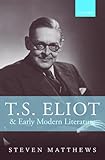T.S. Eliot and early modern literature / Steven Matthews.
Publication details: Oxford: Oxford University Press, 2013.Description: viii, 222 pISBN:- 9780199574773 (hbk.)
- 821 ELI 09 Q31
| Item type | Current library | Call number | Status | Date due | Barcode | Item holds |
|---|---|---|---|---|---|---|
 Books
Books
|
Mahatma Gandhi University Library General Stacks | 821 ELI 09 Q31 (Browse shelf(Opens below)) | Available | 51640 |
Browsing Mahatma Gandhi University Library shelves, Shelving location: General Stacks Close shelf browser (Hides shelf browser)

|

|

|

|

|

|

|
||
| 821 COL 09 Q2 The Oxford handbook of Samuel Taylor Coleridge / | 821 DEV/W R2 A wake-up call/ | 821 ELI 09 Q3 Critical interpretation of T.S Eliot/ | 821 ELI 09 Q31 T.S. Eliot and early modern literature / | 821 ELI/W 09 Q5 The Cambridge companion to the waste land / | 821 HIL 08 Q3 Broken hierarchies : | 821 HIL 09 Q2 Geoffrey Hill: |
Includes bibliographical references (p. [209]-218) and index.
'Without a Harmonising Medium': Eliot in 1919, and Contemporary Criticism of Early Modern Drama -- 'I am not all Heere': Donne, Marlowe, 'disintegration', and the Development of Dramatic Lyricism by Eliot -- 'Signs Never Come Amiss': Early Modern Voices in Eliot's collected poetry to Poems, 1920 -- 'Ideas, and the Sensibility of Thought': The Quest for a Metaphysical Poetry 1920-22 -- Cryptograms: The Waste Land, Sweeney Agonistes, and 'The Hollow Men' -- 'The Pattern Behind the Pattern': Ash-Wednesday, the Ariel poems, and 'Coriolan' -- Towards a New Dramatic Articulation: The Rock and Murder in the Cathedral -- 'A Fusion, in Sympathy of Antipathy': Four Quartets and the Late Plays.
"T.S. Eliot and Early Modern Literature, for the first time, considers the full imaginative and moral engagement of one of the most influential poets of the twentieth century, T.S. Eliot, with the Early Modern period of literature in English (1580-1630). This engagement haunted Eliot's poetry and critical writing across his career, and would have a profound impact on subsequent poetry across the world, as well as upon academic literary criticism, and wider cultural perceptions. To this end, the book elucidates and contextualizes several facets of Eliot's thinking and its impact: through establishment of his original and eclectic understanding of the Early Modern period in relation to the literary and critical source materials available to him; through consideration of uncollected and archival materials, which suggest a need to reassess established readings of the poet's career; and through attention to Eliot's resonant formulations about the period in consequent literary, critical and artistic arenas. To the end of his life, Eliot had to fend off the presumption that he had, in some way, 'invented' the Early Modern period for the modern age. Yet the presumption holds some force - it is famously and influentially an implication running through Eliot's essays on that earlier period, and through his many references to its writings in his poetry, that the Early Modern period formed the most exact historical analogy for the apocalyptic events (and consequent social, cultural and literary turmoil) of the first half of the twentieth-century. T.S. Eliot and Early Modern Literature gives a comprehensive sense of the vital engagement of this self-consciously modern poet with the earlier period he always declared to be his favourite."--Publisher's website.


There are no comments on this title.